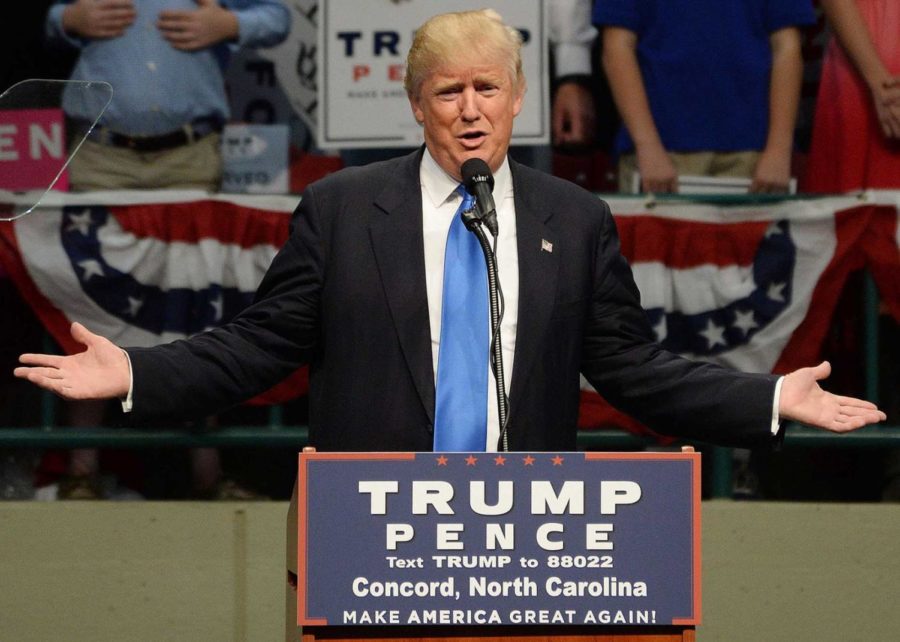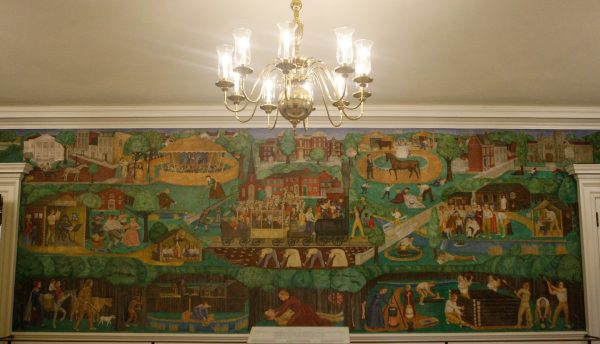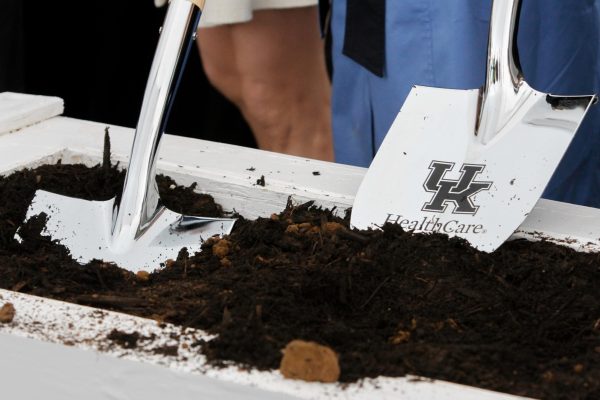Polls defied, campus divided in Trump victory
Republican presidential candidate Donald Trump speaks during a campaign rally at the Cabarrus Arena and Events Center in Concord, N.C., on Thursday, Nov. 3, 2016. (Diedra Laird/Charlotte Observer/TNS)
November 8, 2016
After one of the most heated and divisive campaign seasons in recent history, Republican Donald Trump won the 2016 presidential election.
The millionaire businessman and president-elect secured Kentucky’s eight electoral votes with more than 60 percent of Kentuckians casting Republican ballots. He beat Democratic nominee Hillary Clinton and defied pollsters, nearly all of which predicted a Clinton victory.
On campus, the win could deepen the divide between Trump supporters and detractors. Many minority students said they fear Trump’s presidency will inflame feelings of racism that would have otherwise laid dormant.
For Trump supporters, though, his unusual campaign exhibited an honesty that is all but nonexistent in other candidates — particularly in Clinton.
“I feel like he’s a visionary,” business management freshman Hunter Golightly said. “I feel like he sees things a lot more clearly than Clinton.”
Golightly’s friends agreed. They said President Trump will prevent terrorism, improve the economy and discourage businesses from shipping jobs overseas.
For engineering freshman Hayden Dickens, improving safety is priority number one. Dickens criticized President Barack Obama’s foreign policy decisions, including Obama’s support of the Iran Nuclear Deal. Dickens said the Obama administration has made it easier for terrorists to attack American citizens, and said Clinton would do more of the same.
“Anybody but Hillary,” he said. “I agree with Trump’s policies. He’s the best option we have.”
Trump’s “Make America Great Again” campaign has fueled debate over race relations, immigration and the acceptance of refugees. While supporters at Trump’s rallies cheered his remarks, critics say his rhetoric gives credence to racism and hatred.
Nasreen Omran, a dietetics junior who is also a Muslim, summarized her attitude toward a Trump presidency in one word: “Terrified.”
“He’s instigating so much hate and fear in the American people,” Omran said. “I have yet to meet a Muslim who supports Trump.”
For Armando Diaz, a biology sophomore and secretary of the Latino Student Union, Trump’s rhetoric about Latino immigrants cuts deep.
Diaz said Trump’s proposed policies — especially his proposal to build a wall along the U.S.-Mexico border — threaten what it means to be American. His parents, who immigrated from Mexico before Diaz was born, and other Latino students share his concerns.
“For the most part, people are scared,” he said. “For my parents to see that they’re not welcome here, that they aren’t contributing to American society, that puts us down as a whole race, a whole ethnicity, that we’re viewed as some kind of evil.”
UK associate political science professor Stephen Voss said this election was another example of how pollsters have failed to accurately predict the Republican vote.
In 2014, polls also underestimated the Republicans, but to a lesser extent.
This inaccuracy could be attributed to what Voss called the “social desirability effect” — the idea that poll respondents are less likely to voice socially undesirable or politically incorrect opinions during polls than they are during elections.
Voss said it is also possible many Trump supporters were distrustful of pollsters, and did not answer polls at all.
Regardless, the reliability and trustworthiness of polls could deteriorate with Trump’s surprise win.
“These people need to have people trust their data,” Voss said. “We’ve seen polling firms lose contracts because of loss of faith in the poll.”
Trump’s concrete and direct impact at UK and higher education in general remains unclear.
According to the National Association of Student Financial Aid Administrators, Trump never released a formal higher education plan.
Trump’s campaign co-chair Sam Clovis laid out some of Trump’s higher education plans in an “Inside Higher Ed” article. Those plans include privatizing student loans and rejecting Obama’s proposal to offer free community college for recent high school graduates.
UK political science professor Donald Gross said Trump does not seem to have much interest in higher education, so it is unlikely he will make much impact as president.
“The one thing about Trump is there’s a large number of unknowns,” Gross said. “For a number of positions he’s taken, a lot of them are very ambiguous.”
UK associate professor in comparative politics Emily Beaulieu said Trump’s presidency could strengthen campus movements that oppose programs like free speech zones and trigger warnings.
Similar diversity initiatives have picked up traction at UK, too. Last year, faculty and staff wrote a letter to President Eli Capilouto calling for, among other things, a required diversity course and more aid for students of color.
Beaulieu said Trump could inspire people who oppose these initiatives to speak up.
“I think we’ll see continued pushback on the need to respect diversity and minority rights,” Beaulieu said. “Anything that does not maximize free speech — even if it is detrimental to members of our student body — that gets criticized.”
A president normally finds it difficult to have that kind of impact, though, because state governments act as buffers between universities and the federal government.
Beaulieu said Gov. Matt Bevin’s Trump-like opinions and his contentious attitude toward Kentucky’s public universities, however, could weaken that buffer and strengthen criticisms of diversity programs.
“My experience has been that UK is trying to be respectful of its diverse population. It is trying to make this campus a place for everybody,” Beaulieu said. “I have no reason to think Eli Capilouto or (Provost) Tim Tracy will wake up tomorrow feeling differently about that.”




















































































































































